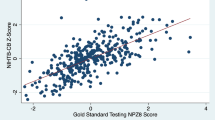Abstract
Construct validity of novel tablet-based neurocognitive tests (in the NeuroScreen app) measuring processing speed, working memory, and executive functioning in adolescents and young adults (AYA) living with perinatally-acquired HIV (PHIV) and perinatal HIV-exposure without infection (PHEU) was examined. Sixty-two AYA (33 PHIV, 29 PHEU) were recruited from an ongoing longitudinal study (CASAH) in New York City. Medium to large and statistically significant correlations were found between NeuroScreen and gold standard, paper-and-pencil tests of processing speed, working memory, and executive functioning. Results provide partial support for NeuroScreen as an alternative to cumbersome paper-and-pencil tests for assessing neurocognition among HIV-affected AYA.
Similar content being viewed by others
References
Smith R, Wilkins M. Perinatally acquired HIV infection: long-term neuropsychological consequences and challenges ahead. Child Neuropsychol. 2015;21(2):234–68. https://doi.org/10.1080/09297049.2014.898744.
Mitchell W. Neurological and developmental effects of HIV and AIDS in children and adolescents. Ment Retard Dev Disabil Res Rev. 2001;7(3):211–6. https://doi.org/10.1002/mrdd.1029.
Laughton B, Cornell M, Boivin M, Van Rie A. Neurodevelopment in perinatally HIV-infected children: a concern for adolescence. J Int AIDS Soc. 2013;16(1):18603. https://doi.org/10.7448/IAS.16.1.18603.
Gouse H, Masson CJ, Henry M, et al. Assessing HIV provider knowledge, screening practices, and training needs for HIV-associated neurocognitive disorders. A short report. AIDS Care. 2020. https://doi.org/10.1080/09540121.2020.1736256.
Kamminga J, Cysique LA, Lu G, Batchelor J, Brew BJ. Validity of cognitive screens for HIV-associated neurocognitive disorder: a systematic review and an informed screen selection guide. Curr HIV/AIDS Rep. 2013;10(4):342–55. https://doi.org/10.1007/s11904-013-0176-6.
Robbins RN, Brown H, Ehlers A, et al. A smartphone app to screen for HIV-related neurocognitive impairment. J Mob Technol Med. 2014;3(1):23–6. https://doi.org/10.7309/jmtm.3.1.5.
Robbins RN, Gouse H, Brown HG, et al. A mobile app to screen for neurocognitive impairment: preliminary validation of neuroScreen among HIV-infected south African adults. JMIR Mhealth Uhealth. 2018;6(1):e5. https://doi.org/10.2196/mhealth.9148.
Mellins CA, Brackis-Cott E, Leu CS, et al. Rates and types of psychiatric disorders in perinatally human immunodeficiency virus-infected youth and seroreverters. J Child Psychol Psychiatry. 2009;50(9):1131–8. https://doi.org/10.1111/j.1469-7610.2009.02069.x.
Reitan RM. Trail making test: manual for administration, scoring, and interpretation. Tuscon, AZ: Reitan Neuropsychology Laboratory; 1992.
Sánchez-Cubillo I, Periáñez JA, Adrover-Roig D, et al. Construct validity of the trail making test: role of task-switching, working memory, inhibition/interference control, and visuomotor abilities. J Int Neuropsychol Soc. 2009;15(3):438–50. https://doi.org/10.1017/S1355617709090626.
Wechsler D. Wechsler adult intelligence scale – fourth edition (WAIS-IV). San Antonio, TX: Pearson; 2008.
Conway AR, Kane MJ, Bunting MF, Hambrick DZ, Wilhelm O, Engle RW. Working memory span tasks: a methodological review and user’s guide. Psychon Bull Rev. 2005;12(5):769–86. https://doi.org/10.3758/bf03196772.
Acknowledgements
This work was supported by the National Institute of Mental Health under Grant R01 MH069133, PI: Mellins; National Institute of Child Health and Human Development under Grants R21 HD084197, PI: Robbins and R01 HD095266, PI: Robbins; National Institute of Nursing Research Grant R21 NR015009, PI: Robbins; the National Institute of Mental Health under Grant P30 MH043520, PI: Remien, and T32 MH19139, PI: Sandfort.
Author information
Authors and Affiliations
Corresponding author
Additional information
Publisher's Note
Springer Nature remains neutral with regard to jurisdictional claims in published maps and institutional affiliations.
Rights and permissions
About this article
Cite this article
Robbins, R.N., Kluisza, L., Liu, J. et al. Construct Validity Supports Use of a Novel, Tablet-Based Neurocognitive Assessment for Adolescents and Young Adults Affected by Perinatal HIV from Vulnerable Communities in the United States. AIDS Behav 25, 1185–1191 (2021). https://doi.org/10.1007/s10461-020-03099-3
Accepted:
Published:
Issue Date:
DOI: https://doi.org/10.1007/s10461-020-03099-3




